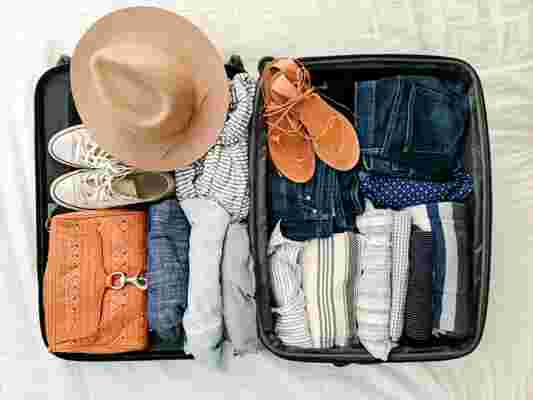
As the United States continues its efforts to vaccinate the population against the coronavirus that causes COVID-19, the Centers for Disease Control and Protection (CDC) recently updated its travel guidelines for fully vaccinated people.
In an announcement on Friday, April 2, the CDC stated that fully vaccinated people who resume domestic travel without a COVID-19 test or self-quarantining pose a minimum risk to themselves. The update also added that fully vaccinated people are able to leave and return to the U.S. without testing or quarantining, so long as their international destination does not require it. The CDC defines someone as “fully vaccinated” once they have completed the two-week waiting period after their second dose of the Pfizer or Moderna vaccines, or two weeks after the Johnson & Johnson vaccine (which is one dose only).
The news certainly comes as exciting for those who are itching to start re-planning those summer vacations that were thwarted during the lost year of 2020, but it’s important to keep in mind that the COVID-19 pandemic is still going on — even while millions of vaccinations are being administered daily. There are currently millions of active cases of COVID-19 throughout the U.S., and scientists have concerns about the variants of the virus , many of which experts are still learning more about. And even with the new guidelines, the CDC is still cautioning people to avoid non-essential travel when they can.
Still, if travel is something that’s in the cards for your post-vaccine 2021, there are some ways to do it mindfully, and as safely as possible — and some other things to definitely avoid. Here’s everything you need to know before packing that suitcase.

If you’re traveling with others, is everyone in your group fully vaccinated?
The CDC previously said that fully vaccinated people from different households can safely spend time together indoors without masks or social distancing at low risk to themselves. If you are planning to travel with members outside your immediate household, you might want to make sure that your companions are fully vaccinated as well. Dr. David Hamer, an infectious disease physician at Boston Medical Center and professor of global health and medicine at Boston University, tells Apartment Therapy that “the safest combination is having two people that are vaccinated traveling together or a group of people that are vaccinated.”
While kids aren’t able to get vaccinated at the present moment, they are also far less likely to experience serious COVID-19 complications than adults if they don’t have any conditions that compromise their immune systems themselves. That said, health officials caution that unvaccinated teenagers and kids should still take precautions like mask-wearing while out in public as they can carry and spread the virus, but the CDC has deemed it safe for vaccinated adults to interact with unvaccinated kids of a single household, so long as no one in their household is at risk for COVID complications.
Can you stay somewhere that will ensure your relative isolation?
Now is not the time to book that super-cheap yet slightly questionable hotel room just because there’s a wild deal online. The CDC advises that the safest option is to book a cabin or vacation rental with people from your immediate household or fully vaccinated companions. A hotel or residence with common spaces is less safe, and if you can, bring your own supplies so that you minimize your interactions with people outside your pod. The CDC urges people to avoid any type of accommodation with a shared bathroom space, like a dorm-style hostel. Save it for the after times!
Can you drive to your destination?
Dr. Hamer points out that the safest mode of transportation would be to drive with members of your immediate household or friends who have all been vaccinated. He adds that if there is an unvaccinated member of the group, they should absolutely be tested and/or quarantining before the trip.
Still, air travel is happening amid the pandemic in record numbers , and more people are expected to fly throughout the spring and summer as vaccinations continue. Dr. Hamer notes that airports have taken precautionary measures to protect travelers, such as enforcing social distancing during boarding and security, and some airlines have even booked flights at reduced occupancy . “I think the highest risk is on the flight itself,” he adds, noting that people often remove their masks in order to eat or drink, and people are in close quarters on a plane. “If someone were infected near you, then there is a risk, although there’s good air exchange on flights.”
The CDC notes that if people must fly, they should choose flights without stops or layovers if possible, and they caution against long-distance train or bus trips.
Have you packed enough masks?
If you plan to travel — especially with a public mode of transportation like flying — it’s crucial to continue to follow health and safety guidelines. “Short-term travel has been feasible for a while [during the pandemic] with safety precautions,” Dr. Hamer points out. “Those include social distancing wherever possible and wearing a mask when in public or on any form of transit.”
He adds that your mask should fit snugly over the mouth and nose, and as an extra precaution, people should consider double masking . And while the vaccine adds an additional layer of protection, it doesn’t mean that all of these rules go out the window. “People still need to follow those measures because the vaccines are not 100 percent effective at preventing an infection,” he says.
Are you keeping tabs on the outbreak rate both at home, and where you’re headed?
Different parts of the U.S. have had different levels of COVID-19 cases all throughout the pandemic, so it’s important to know the facts before you head out of town. The CDC offers a COVID Data Tracker that allows you to see outbreaks by region, along with forecasts for spikes or a decrease in cases. Dr. Hamer also notes that there have been various state-by-state guidelines about testing and quarantining, and while vaccinated people are becoming more exempt from these directives, it’s still helpful to have all the information before you set out on your trip. “Being vaccinated definitely adds a bonus, but trying to determine what the guidance or level of disease is at the destination — and your home state — is going to always be important.
